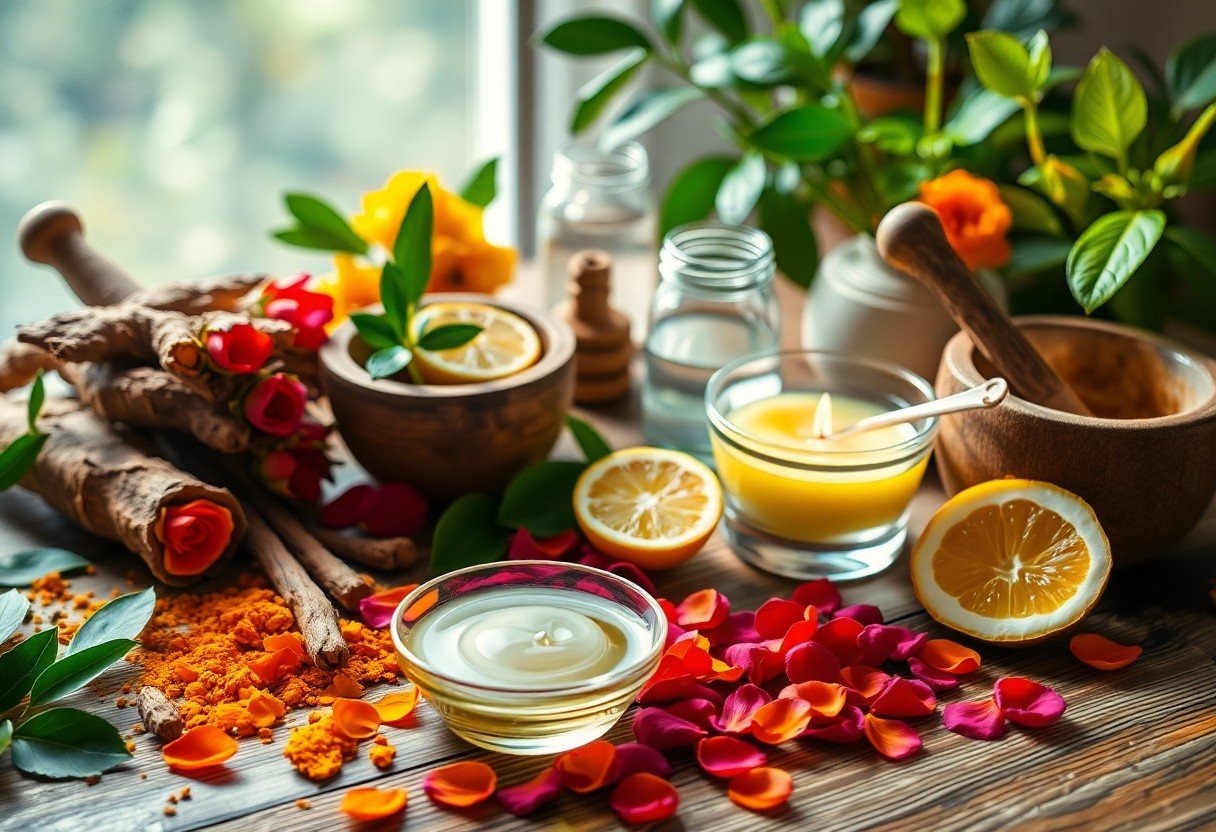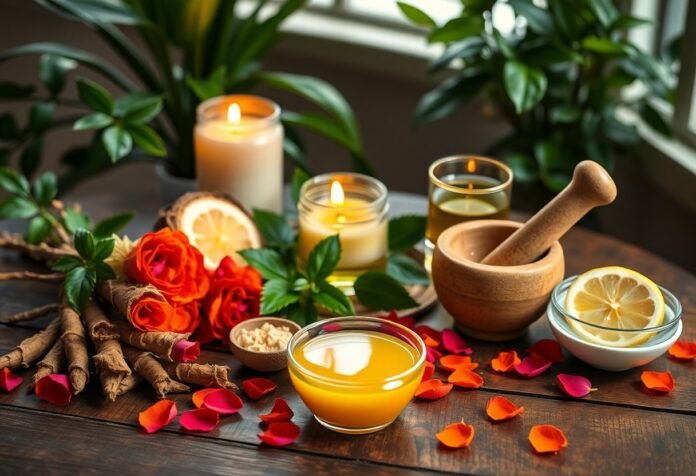Skin health is a reflection of your overall well-being, and Ayurveda offers timeless wisdom to help you achieve a radiant complexion. By integrating natural herbs, oils, and holistic practices into your daily routine, you can enhance your skin’s vitality and appearance. This blog post will guide you through age-old Ayurvedic secrets designed to nourish your skin from the inside out, empowering you to embrace your most luminous self.
Key Takeaways:
- Embrace natural ingredients such as turmeric, aloe vera, and coconut oil, which are known for their skin-soothing and illuminating properties.
- Hydration plays a vital role in achieving glowing skin; drinking warm water infused with herbs like ginger and lemon can enhance radiance.
- A holistic approach, including balanced diets, regular exercise, and mindfulness practices, significantly contributes to overall skin health and vibrancy.
The Ancient Wisdom of Ayurvedic Texts
Ayurvedic texts, written thousands of years ago, offer profound insights into skincare that remain relevant today. These ancient scriptures emphasize the importance of balancing the three doshas—Vata, Pitta, and Kapha—each associated with distinct skin attributes. By understanding your dosha, you can tailor your skincare routine to enhance your natural glow. The texts elaborate on integrating specific herbs, oils, and dietary practices that nourish the skin from within, ensuring a radiant appearance.
Key Principles of Ayurveda
At the heart of Ayurveda are the principles of balance, harmony, and individualized care. Each person is unique, with distinct physical and psychological traits that influence their health. The aim is to align your lifestyle, diet, and skincare choices with your individual constitution. By focusing on prevention rather than just treatment, Ayurveda promotes a holistic approach to achieving healthy, glowing skin through well-rounded practices encompassing the mind and body.
The Connection Between Mind, Body, and Skin
Your skin reflects your inner state, making the mind-body connection vital in Ayurveda. Emotional health directly influences your skin’s appearance, often manifesting as breakouts, dryness, or dullness when imbalances occur. Ayurveda teaches that stress reduction techniques, such as meditation and yoga, can improve not only mental well-being but also the health and vitality of your skin. Recognizing this interconnectedness allows you to adopt a more comprehensive approach to skincare.
Scientific studies have shown that stress can lead to increased cortisol levels, which can negatively impact your skin’s elasticity and overall brightness. Techniques like meditation not only reduce stress but also encourage a positive mindset, promoting skin healing. Regularly practicing self-care rituals, like facial massages with herbal oils, can enhance blood circulation and lymphatic drainage, contributing to a radiant complexion. By nurturing both your mind and body, you inevitably create the perfect environment for flourishing skin.
Essential Herbs for Radiant Complexion
Harnessing the power of nature, certain herbs have been celebrated in Ayurveda for their ability to enhance skin health and promote a glowing complexion. Incorporating these botanicals into your beauty routine can lead to remarkable results. Whether it’s tackling blemishes or brightening your skin tone, these imperative herbs are your allies in achieving that coveted radiance.
Turmeric: Nature’s Brightening Agent
Turmeric, often hailed as a superfood, is renowned for its skin-brightening properties. Rich in curcumin, it aids in reducing hyperpigmentation and evening out skin tone. You can easily create a face mask by mixing turmeric with yogurt or honey for a revitalizing treatment that leaves your skin luminous.
Neem: The Anti-Acne Miracle
Neem is celebrated for its potent antibacterial and anti-inflammatory properties, making it a powerhouse in combating acne. Known as a cooling herb in Ayurveda, it helps unclog pores and reduce blemishes, providing you with clearer skin. With consistent use, neem can significantly change your skin’s texture and clarity.
Incorporating neem into your skincare routine can be transformative. You can use neem oil as a topical treatment or steep neem leaves in hot water to create a soothing face wash. This natural remedy not only helps to treat active acne but also prevents future breakouts. Many people have found success after regularly using neem, noting an overall reduction in oiliness and inflammation, making it an imperative herb for anyone seeking to maintain a clear complexion.

Daily Rituals for Enhanced Glow
Incorporating specific daily rituals into your skincare routine can dramatically enhance your natural glow. Establishing a consistent morning and evening regimen focused on cleansing, nourishing, and hydrating your skin allows you to reap the full benefits of Ayurveda. From herbal infusions to gentle exfoliation, these practices not only improve your skin’s appearance but also promote mental well-being, aligning your body and mind for a holistic approach to beauty.
Skin-Cleansing Techniques in Ayurveda
Ayurveda emphasizes the importance of clean skin to unveil its inner luminosity. Using natural cleansers like chickpea flour or sweet almond oil can effectively remove impurities without stripping your skin’s natural oils. These gentle techniques help maintain the skin’s moisture barrier, keeping it hydrated and supple while allowing your unique glow to shine through.
The Role of Oil Massages in Rejuvenation
Oil massages, or Abhyanga, play an important role in Ayurvedic skincare, providing both physical and emotional benefits. Regularly massaging your skin with warm, nourishing oils aids in circulation, promotes lymphatic drainage, and helps detoxify your body. This not only rejuvenates the skin but also enhances its elasticity, leaving it looking vibrant and youthful.
Incorporating oil massages into your routine transforms your skincare experience into a pampering ritual. Select oils like sesame, almond, or coconut, rich in antioxidants and fatty acids, which penetrate deeply to hydrate and repair your skin. Warm the oil before applying it, allowing it to absorb better and deliver maximum benefits. Performing these massages a few times a week can significantly rejuvenate your skin, reduce dryness, and provide a boost to your complexion, ensuring you maintain a healthy glow year-round.
Diet and Its Impact on Skin Health
Your skin reflects what you consume, highlighting the importance of a balanced diet rich in nutrients. Foods high in antioxidants, vitamins, and healthy fats contribute significantly to skin health. Incorporating a variety of fruits, vegetables, and whole grains not only promotes better digestion but also nourishes your skin from within. For instance, vitamin C from oranges and berries can brighten your complexion, while omega-3 fatty acids from fish can aid in maintaining skin hydration and elasticity. Prioritizing these dietary choices ensures your skin receives the fuel it needs to thrive.
Foods to Boost Natural Radiance
The Importance of Hydration and Detoxification
Staying adequately hydrated is vital for maintaining your skin’s resilience and luster. Water aids in the elimination of toxins from your body and ensures optimal moisture levels in your skin. In Ayurveda, detoxification practices like Panchakarma not only cleanse the body but also enhance your skin’s natural glow by promoting circulation and nutrient absorption. Drinking herbal teas, such as dandelion or nettle, can further support detoxification while offering additional benefits like anti-inflammatory properties.
Hydration also plays a pivotal role in maintaining skin elasticity and softness. Dehydration can lead to dry, dull skin and accelerate the appearance of fine lines. Aim for at least eight glasses of water daily, and consider incorporating hydrating fruits like watermelon and cucumbers into your diet. While internal hydration is vital, applying natural moisturizers externally—such as aloe vera or coconut oil—can lock in moisture and create a luminous effect. A holistic approach to hydration and detoxification ensures your skin not only looks vibrant but also feels rejuvenated.
Mindfulness Practices for Skin Wellness
Implementing mindfulness practices into your daily life not only promotes inner peace but can also significantly improve your skin’s appearance. By cultivating awareness of your thoughts and emotions, you create a positive impact on your overall skin health. Stress reduction techniques harmonize your internal state, which ultimately reflects in your skin, lending it a youthful radiance.
The Stress-Skin Connection
Stress is a known aggravator of skin conditions such as acne, eczema, and psoriasis. When you’re under pressure, your body produces cortisol, leading to increased oil production and inflammation. This connection between emotional well-being and skin health emphasizes the necessity of managing stress for achieving a luminous complexion.
Breathing and Meditation Techniques
Incorporating breathing exercises and meditation into your routine can profoundly affect your skin. Simple techniques, such as deep abdominal breathing, activate your body’s relaxation response, reducing anxiety and promoting a peaceful state of mind. Regularly practicing mindfulness and meditation helps balance the emotional turbulence that can contribute to skin flare-ups, fostering a clearer, more radiant appearance.
Engaging in daily meditation sessions as short as 10 minutes can set positive intentions while calming your mind. Techniques such as ‘3-Part Breathing’ or ‘Body Scan’ bring awareness to areas of tension, promoting relaxation. Gentle, focused breathing not only slows your heart rate but also ensures a steady flow of oxygen to your skin, enhancing its luster and vibrancy. Study after study underscores the beneficial impact of mindfulness on skin health, encouraging you to adopt these practices for the best possible results.
Summing up
Taking this into account, incorporating Ayurvedic secrets into your skincare routine can help you achieve glowing skin by balancing your doshas and nourishing your body from within. By using natural ingredients like turmeric, aloe vera, and coconut oil, you can enhance your skin’s vitality and radiance. Additionally, embracing a holistic lifestyle that includes a balanced diet, hydration, and mindfulness will support your skin health. With these insights, you are empowered to unlock your skin’s natural beauty and maintain a healthy glow.
FAQ
Q: What are some basic Ayurvedic principles for achieving glowing skin?
A: Ayurveda emphasizes balancing your doshas (body energies) to promote overall health, which reflects on your skin. Key practices include maintaining a balanced diet rich in fresh fruits, vegetables, whole grains, and healthy fats. Hydration is also vital, so drink plenty of water and herbal teas. Using natural ingredients like turmeric, sandalwood, and aloe vera can enhance skin health. Lastly, regular self-care practices such as yoga and meditation reduce stress and improve skin vitality.
Q: Which Ayurvedic herbs are best for skincare?
A: Several herbs are known for their skin-enhancing properties. Turmeric is renowned for its anti-inflammatory and antiseptic qualities, promoting a clear complexion. Neem combats acne and soothes irritation. Ashwagandha helps to reduce stress, which can have a positive effect on your skin. Amla (Indian gooseberry) is high in vitamin C and is excellent for revitalizing the skin. Incorporating these herbs into your skincare routine or diet can lead to noticeable improvements.
Q: How can I create an Ayurvedic skincare routine at home?
A: To create an effective Ayurvedic skincare routine, start with cleansing using natural oils or herbal soaps to remove impurities without stripping your skin. Follow with a face scrub made from gram flour and turmeric to exfoliate. Apply a mask using ingredients like honey, aloe vera, or sandalwood to nourish and hydrate your skin. Finally, use suitable herbal oils or moisturizers before bedtime. These steps should ideally be performed on a regular basis, tailoring the routine to fit your skin type.
Q: What dietary changes should I make according to Ayurveda for better skin health?
A: For glowing skin, Ayurveda suggests including foods that are light, easy to digest, and packed with nutrients. Favor seasonal fruits and vegetables, particularly those that are high in antioxidants. Incorporate healthy fats like ghee, coconut oil, and nuts, which nourish the skin from within. Minimize processed foods, sugars, and excessive caffeine to reduce inflammation and improve skin clarity. Additionally, spices such as cumin, coriander, and ginger can enhance digestion and rejuvenate the skin.
Q: Can Ayurvedic treatments help with specific skin issues like acne or pigmentation?
A: Yes, Ayurveda offers targeted treatments for various skin concerns. For acne, neem and turmeric can be used in topical formulations to reduce inflammation and bacteria. For pigmentation, treatments often include ingredients such as licorice and saffron that can lighten dark spots and even out skin tone. Consulting with an Ayurvedic practitioner for personalized remedies based on your dosha and skin type can lead to more effective results in addressing specific skin issues.
